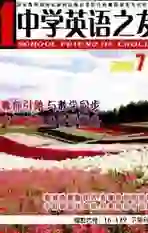常见副词的区别用法
2010-08-31欧惠宁
欧惠宁
1. still, already与just 的用法
⑴still, already, just 等几个表示时间的副词通常位于句中词实义动词之前,动词be、助动词、情态动词之后)。
Hes just left for school. 他刚刚去学校。
I have already finished my work.
我已经做完了工作。
⑵still和already也可位于动词be、助动词等之前。
She was still [still was] beautiful at the age of forty. 她到了40岁仍然很美。
I already have told him about it.
我已经把情况告诉他了。
⑶still若用于否定句,则总是位于助动词之前。
I still dont understand what you mean.
我还是不明白你的意思。
⑷另外,still 和already 还可位于句末,表示惊奇。
Are you on page one still? 你还在看第1页吗?
Is your mother back already?
你妈妈已经回来了吗?
2. already 和 yet 的区别
already用于肯定句句中,表示“已经”; yet用于否定句句末,表示“还”,用于疑问句句末,表示“已经”。
He had already left when I called.
当我给他打电话时,他已经离开了。
Have you found your ruler yet?
你已经找到你的尺子了吗?
I havent finished my homework yet.
我还没有完成作业。
注意:already还可以表示惊奇,惊讶等语气,常用于疑问句句末。
Has your son gone to school already?
你的儿子已经上学了吗?(表示很惊讶)
3. very much和very much的区别
very用于修饰形容词或副词的原级; much用于修饰形容词或副词的比较级;修饰动词要用very much。
John is very honest. 约翰非常诚实。
This garden is much bigger than that one.
这个花园比那个大的多。
Thank you very much. 非常感谢你。
注意:副词very 可以修饰形容词,但不能修饰动词。
改错:(错)I very like English.
(对)I like English very much.
注意:副词enough要放在形容词的后面,形容词enough放在名词前后都可。
I dont know him well enough.
There is enough food for everyone to eat.
There is food enough for everyone to eat.
4. so与such的区别
⑴so修饰形容词或副词; such修饰名词。
My brother runs so fast that I cant follow him.
我弟弟跑得那么快以至于我跟不上他。
He is such a boy. 他是一个这样的孩子。
⑵so修饰的形容词后可以有一个单数的可数名词,其结构是“so+形容词+a/an+可数名词单数”。such可以修饰可数名词单复数和不可数名词,名词前可以有形容词作定语,其结构是“such+a/an+形容词+可数名词单数”,“such+形容词+可数名词复数/不可数名词”。
He is so clever a boy.=He is such a clever boy. 他是一个如此聪明的孩子。
It is such cold weather. 这么冷的天气。(正)
It is so cold weather. (误)
They are such good students.
他们是那么好的学生。(正)
They are so good students. (误)
⑶如果可数名词复数前有many, few或不可数名词前有much, little修饰,用so不用such。例如,so many(如此多的), so few(如此少的)可以加可数名词复数; so much(如此多的), so little(如此少的)可以加不可数名词。
5. also, too, as well与either的区别
also, as well, too,用于肯定句,also常用于be动词,情态动词,助动词之后,行为动词之前; as well,too用于句末; either用于否定句中,置于句末。
My father is a teacher. My mother is also a teacher.=My father is a teacher. My mother is a teacher as well.=My father is a teacher. My mother is a teacher, too. 我爸爸是一名老师,我妈妈也是。
I cant speak French. Jenny cant speak French, either. 我不会说法语,詹妮也不会。
6. sometime, sometimes, some time与some times的区别
sometime:某一时间,某一时刻,可指将来,也可指过去; sometimes:有时,不时的; some time:一段时间; some times:几次,几倍。
Well have a test sometime next month.
下个月的某一时间,我们要进行一次测试。
Sometimes we are busy and sometimes we are not. 有时我们很忙,有时不忙。
He stayed in Beijing for some time last year.
他去年在北京呆了一段时间。
I have been to Beijing some times.
我去过北京好几次。
7. ago与before的区别
ago表示以现在为起点的“以前”,常与一般过去时连用,不可以单独使用; before指过去或将来的某时刻“以前”,也可泛指以前,常和完成时连用,可以单独使用。
I saw him ten minutes ago.
我十分钟之前看到的他。
He told me that he had seen the film before.
他告诉我他以前看过这场电影。
8. now, just与just now的区别
now与一般现在时、现在进行时、现在完成时连用,意为“现在”; just与现在完成时、过去完成时连用,表示“刚……”;just now和过去时连用,表示“刚才”。
Where does he live now?他现在住哪里?
We have just seen the film.
我们刚看过这场电影。
He was here just now. 他刚才在这里。
